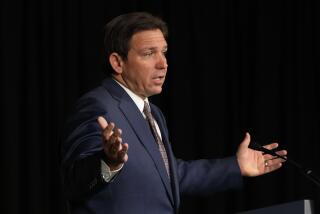Mistrial Motions Denied in King Case : Courts: Judge rejects questions involving possible juror bias and attorney conflict of interest. Opening statements are scheduled for today.
- Share via
The judge in the Rodney G. King beating trial Wednesday denied defense mistrial motions involving a black juror’s possible bias and rejected a defendant’s claim of attorney conflict, issues that threatened to derail the trial.
The process of selecting alternate jurors then began and opening statements remained scheduled for today. The sworn jury stayed home awaiting instructions to report to a hotel to be sequestered.
One of the rulings by U.S. District Judge John G. Davies stemmed from an undertone of racial tension that surfaced when an excused white juror accused a black woman accepted for the jury of making racially based remarks detrimental to the defense.
Davies, who questioned the accusing man in secret, said: “There was no appropriate showing (of bias).”
Davies denied the motions for mistrial, but added that he would consider questioning the black juror briefly after he reviews legal precedents.
Four white policemen are charged with violating the civil rights of King, a black motorist who was beaten after a police chase on March 3, 1991. The beating was videotaped and broadcast worldwide.
The trial in federal court is the second for the defendants. The first trial, in state court in suburban Simi Valley, ended in acquittals on all but one charge, sparking three days of deadly rioting in Los Angeles.
In the federal trial Wednesday, Davies found in another key ruling that defendant Timothy E. Wind previously agreed to accept attorney Paul DePasquale even though Wind knew the lawyer could have a conflict of interest.
DePasquale was part of a law firm that represents defendant Laurence M. Powell and may have been privy to confidential information about Powell’s defense.
The judge held a half-day hearing on the issue in secret and said he considered it so important that he would issue a written order explaining his reasons for ruling against Wind. He suggested Wind’s effort to retract his waiver of conflict came too late.
“It’s obvious there was a conflict,” attorney Harland Braun said outside court. “It’s probably a practical decision (saying) let’s plunge forward and if Wind is acquitted, which he will be, it won’t matter.”
If Wind were convicted, the matter could be raised on appeal.
Concerning the black juror, Braun suggested it was just a misunderstanding between prospective jurors. But he said, “I think it would be healthy to get to the bottom of it.”
Attorney Ira Salzman, representing Sgt. Stacey C. Koon, said he would be satisfied only if the judge questions the black juror.
“This is not a tempest in a teapot,” he said. “I do not take a mistrial motion lightly.”
The jury sworn in Monday for the federal trial includes two blacks. The defense lost a bid to remove a black man because the move seemed racially based.
Salzman said the dismissed juror who complained, a white reserve policeman, reported that the black woman Postal Service employee told him she blamed the defense for the absence of blacks on the Simi Valley jury, and believed the defense would maneuver to keep blacks off the federal trial.
In jury selection, the woman said the composition of the jury made no difference to her and she didn’t consider the case “a black-white issue.”
Defense lawyers argued that the potential for prejudice to them was so great that jury selection should be reopened or the case should be tried with 11 jurors. The judge refused.
It was not known what the ex-juror said in chambers to prompt the mistrial motions. The judge sealed the transcript of the hearing.
More to Read
Sign up for Essential California
The most important California stories and recommendations in your inbox every morning.
You may occasionally receive promotional content from the Los Angeles Times.













